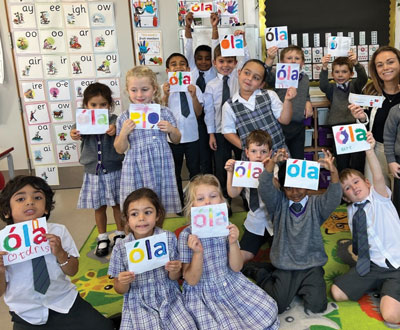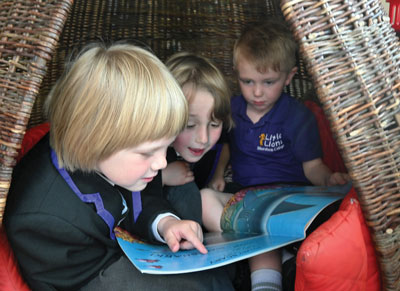
by Helen Abbott
Subject Leader for Languages at Banstead Prep School
Why learning two or more foreign languages at primary level boosts success
If my younger self were to have given my rather more mature self a piece of advice, it would probably have been to avoid teaching French and Spanish alongside one another. They look and sound too similar and young children are, arguably, still trying to get to grips with their own language.
However, experience has taught me otherwise. Primary school children are incredibly flexible: their minds are not entrenched in notions about how language should behave and their ability to mimic sounds is at its peak. Telling them that the French word for yes, oui is spelled, well, like that, does not phase them, just as showing them that oie sounds more like a crying baby than a slightly rude interjection, does not confound them; they accept more readily that some things are just done differently. Besides, shouting “Oie! Oie!” (or “wa wa” as it actually sounds) is fun at the age of eight but excruciatingly embarrassing at the age of 15!
Make each language distinct
The key to success is to make each language as different as possible. Visual and physical separation, such as having coloured folders for Spanish and exercise books for French, distinct sides of the classroom to display each language, opposing colours to represent each, different seating plans for each lesson, and varying teaching styles all work well. Additionally, because French remains the main language at our school, the children can expect to do more writing in these lessons, while Spanish is packed to the rafters with games and oral activities. This approach ensures that both languages have unique identities in the students’ minds.
Making connections between languages
On the other hand, while I don’t teach grammar explicitly in Spanish, it is easy to allude to it by comparing it to French. Students who grasp grammatical concepts like gendered nouns and adjective agreement in one language can quickly transfer that knowledge to another. You start to witness inspirational bulbs lighting up every lesson as the children see how much Spanish, French and English are connected.
Recognising familiar words also accelerates learning. The word for bread in Spanish, “pan”, is a piece of cake to pronounce (every pun intended!) French, on the other hand, has “pain” – which looks like it should be more about sore feet than a sandwich – until you realise it’s actually pronounced similarly to the Spanish “pan”. Once children make that connection, they have mastered two words in two different languages – no pain involved!
The overwhelming message is that learning two modern languages does not completely bewilder them but instead opens up extra learning possibilities and deeper understanding.
A fresh start and renewed enthusiasm
The main advantage of introducing a new language is that it injects new energy into the learning of all languages. The excitement of a new subject is palpable, and the fact that they are learning how to use the language orally, rather than worrying about being assessed at every corner, makes the experience more enjoyable for them and they relax into their learning.
Breaking the myth of confusion
Do children confuse the two languages? Sometimes. But it’s more a case of them not being sure which language we’re studying when they want to look something up than combining the two languages – “Are we in French or Spanish?” is frequently asked halfway through a lesson. Interestingly, however, they seem to categorise instinctively all the words they learn together, so that, even though they may not be sure which language all those animal words they’ve just learnt belong to, they know they are the same language, and they don’t cross over into the other. They are far less confused by the acquisition of two languages than my GCSE students were, because they are learning them at a slower pace and within clear topics. I’m certain that by the time they get to secondary school, they will know which one is which!
The long-term benefits
When children begin school, they are still mastering their native language. It may seem ambitious to expect them to leave Year 6 with a solid foundation in French, Spanish and even some Latin (with a touch of Ancient Greek). Yet, over the past three years, I have seen students at Banstead Prep achieve exactly that.
Languages are more than just words; they’re windows into different cultures. Teaching two foreign languages at primary level doesn’t confuse students – it broadens their horizons, strengthens cognitive skills and fosters a lifelong love of languages. And seeing young learners make connections and embrace new languages? Totally worth the challenge!
Helen Abbott is the Subject Leader for Languages at Banstead Prep School, a coeducational nursery, pre-school and prep school for children aged 2 – 11. For more information please visit www.bansteadprep.com












